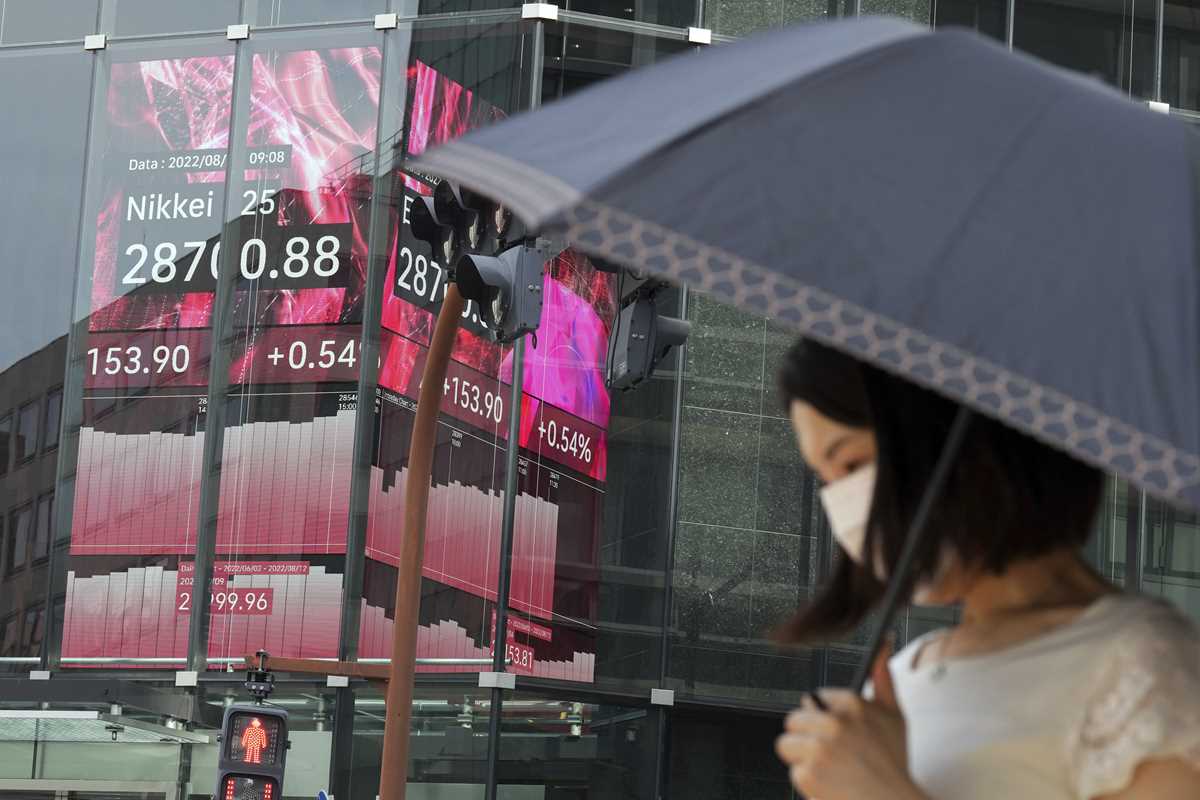 A person wearing a protective mask walks past an electronic stock board showing Japan's Nikkei 225 index at a securities firm Monday, Aug. 15, 2022, in Tokyo. Shares were mixed in Asia on Monday after China's central bank cut a key interest rate and Japan reported its economy expanded at a faster pace in the last quarter. (AP Photo/Eugene Hoshiko)
A person wearing a protective mask walks past an electronic stock board showing Japan's Nikkei 225 index at a securities firm Monday, Aug. 15, 2022, in Tokyo. Shares were mixed in Asia on Monday after China's central bank cut a key interest rate and Japan reported its economy expanded at a faster pace in the last quarter. (AP Photo/Eugene Hoshiko)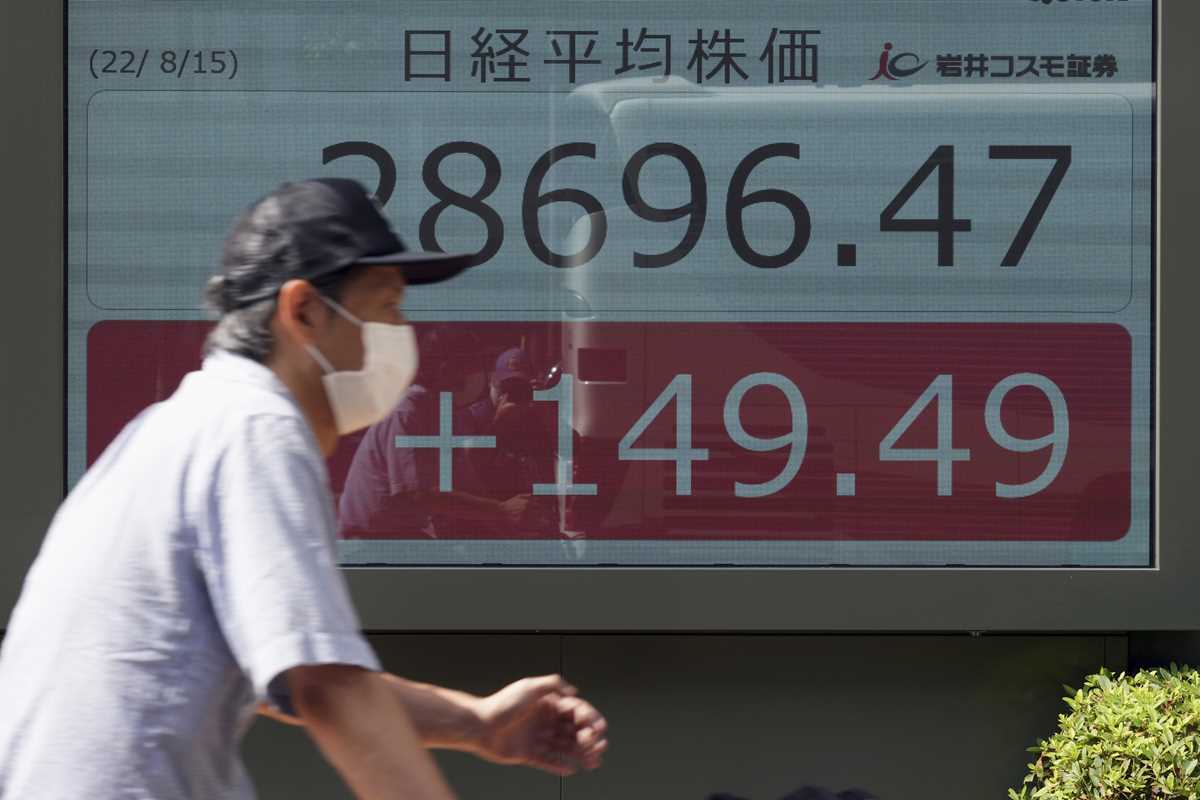 A person wearing a protective mask rides a bicycle along an electronic stock board showing Japan's Nikkei 225 index at a securities firm Monday, Aug. 15, 2022, in Tokyo. Shares were mixed in Asia on Monday after China's central bank cut a key interest rate and Japan reported its economy expanded at a faster pace in the last quarter. (AP Photo/Eugene Hoshiko)
A person wearing a protective mask rides a bicycle along an electronic stock board showing Japan's Nikkei 225 index at a securities firm Monday, Aug. 15, 2022, in Tokyo. Shares were mixed in Asia on Monday after China's central bank cut a key interest rate and Japan reported its economy expanded at a faster pace in the last quarter. (AP Photo/Eugene Hoshiko)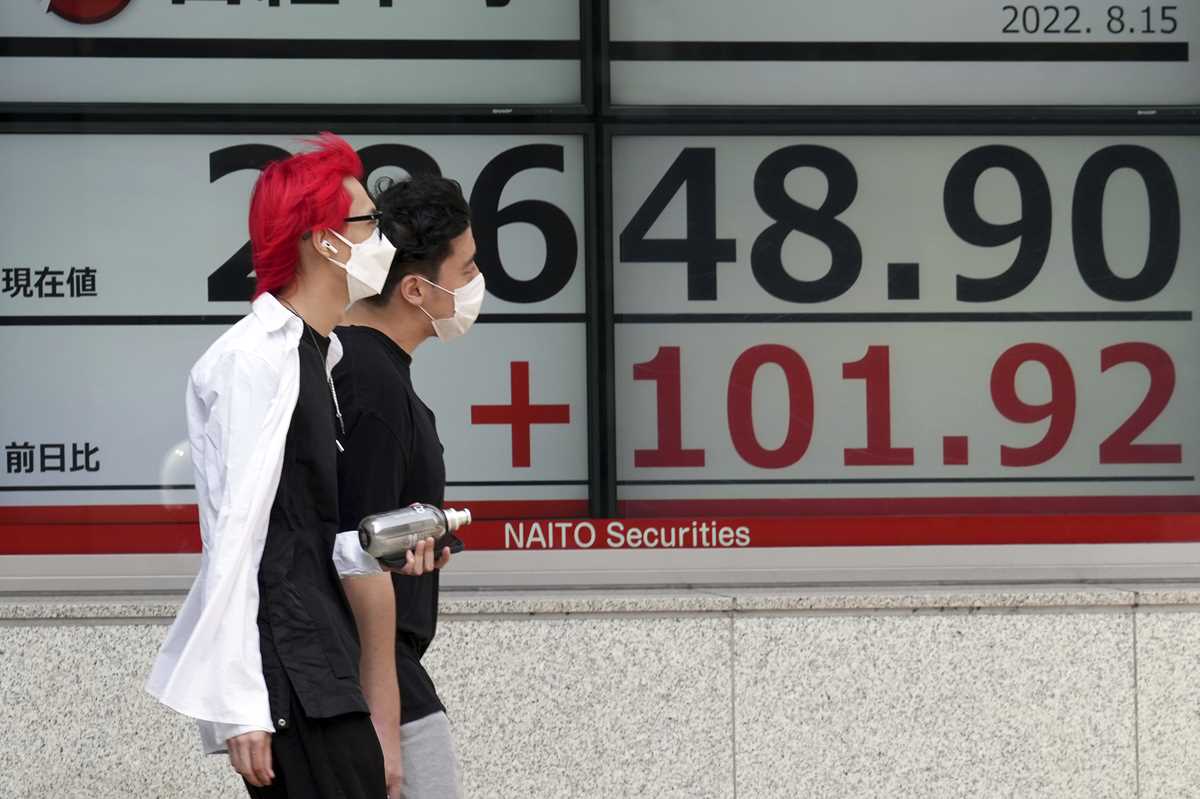 People wearing protective mask walk past an electronic stock board showing Japan's Nikkei 225 index at a securities firm Monday, Aug. 15, 2022, in Tokyo. Shares were mixed in Asia on Monday after China's central bank cut a key interest rate and Japan reported its economy expanded at a faster pace in the last quarter. (AP Photo/Eugene Hoshiko)
People wearing protective mask walk past an electronic stock board showing Japan's Nikkei 225 index at a securities firm Monday, Aug. 15, 2022, in Tokyo. Shares were mixed in Asia on Monday after China's central bank cut a key interest rate and Japan reported its economy expanded at a faster pace in the last quarter. (AP Photo/Eugene Hoshiko)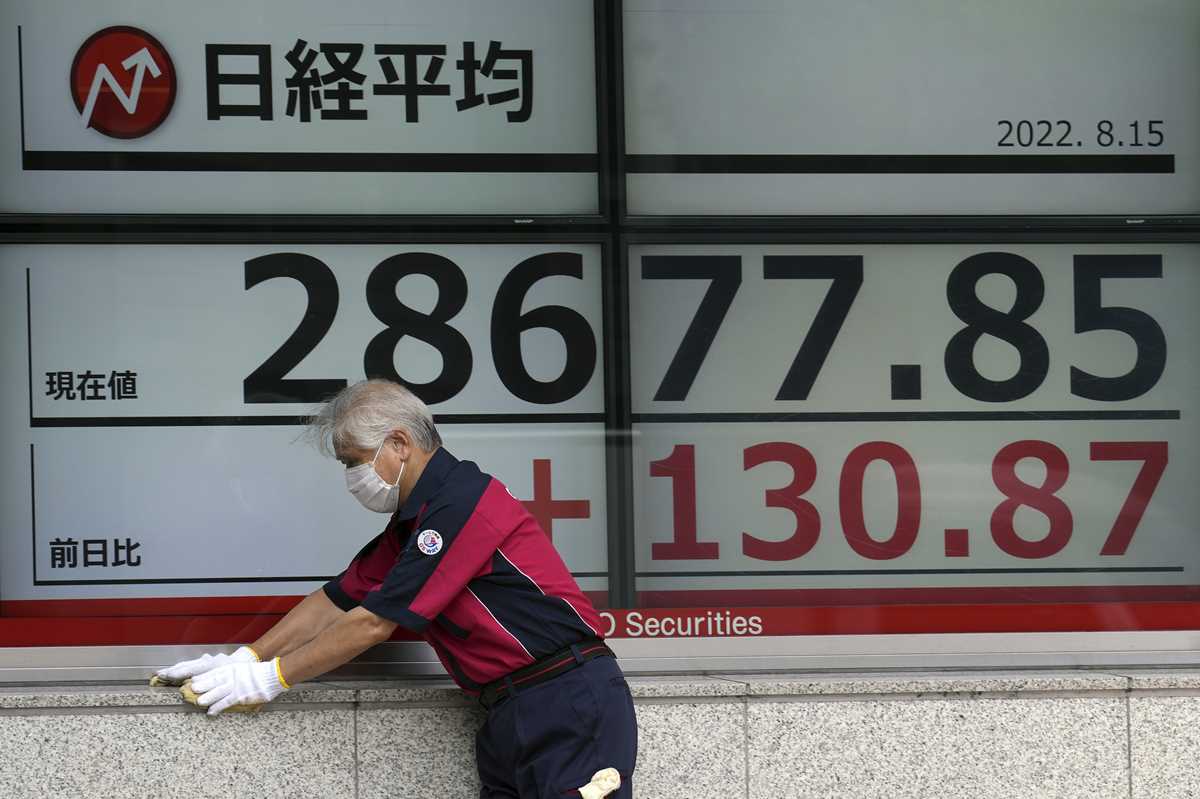 A staff wearing a protective mask cleans an electronic stock board showing Japan's Nikkei 225 index at a securities firm Monday, Aug. 15, 2022, in Tokyo. Shares were mixed in Asia on Monday after China's central bank cut a key interest rate and Japan reported its economy expanded at a faster pace in the last quarter. (AP Photo/Eugene Hoshiko)
A staff wearing a protective mask cleans an electronic stock board showing Japan's Nikkei 225 index at a securities firm Monday, Aug. 15, 2022, in Tokyo. Shares were mixed in Asia on Monday after China's central bank cut a key interest rate and Japan reported its economy expanded at a faster pace in the last quarter. (AP Photo/Eugene Hoshiko)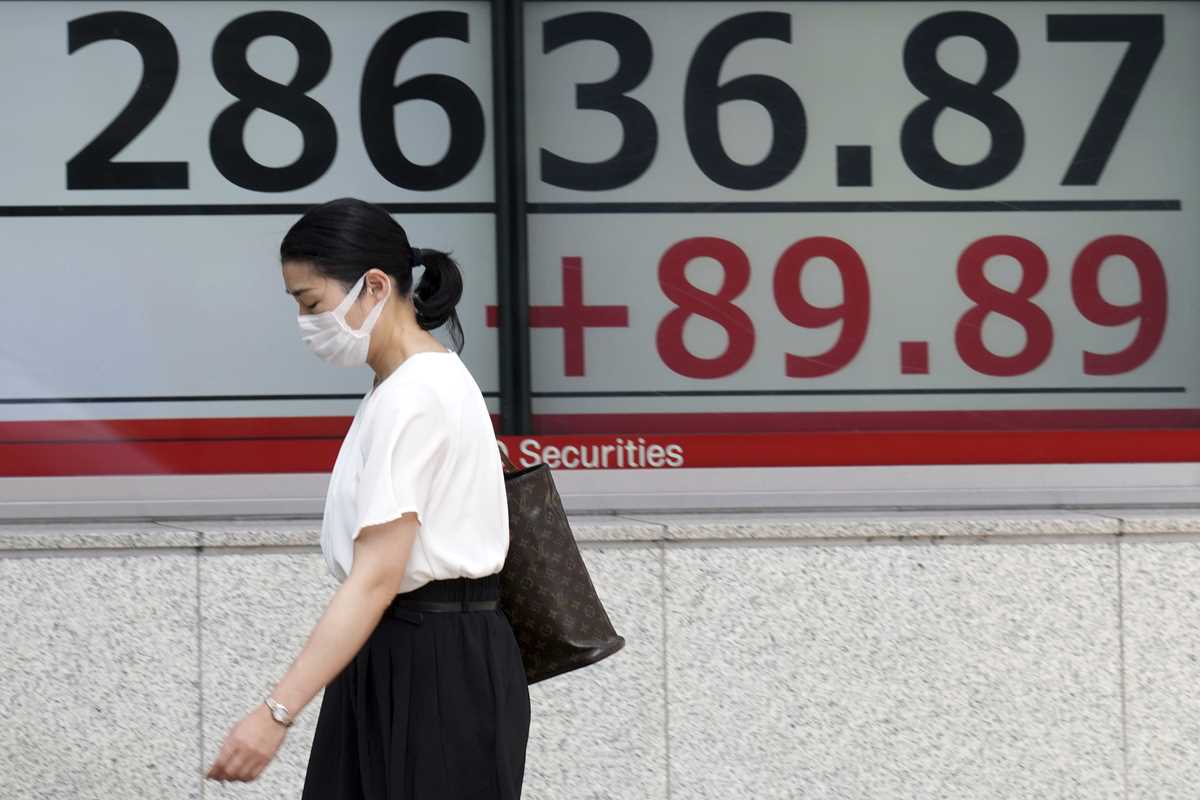 A person wearing a protective mask walks past an electronic stock board showing Japan's Nikkei 225 index at a securities firm Monday, Aug. 15, 2022, in Tokyo. Shares were mixed in Asia on Monday after China's central bank cut a key interest rate and Japan reported its economy expanded at a faster pace in the last quarter. (AP Photo/Eugene Hoshiko)
A person wearing a protective mask walks past an electronic stock board showing Japan's Nikkei 225 index at a securities firm Monday, Aug. 15, 2022, in Tokyo. Shares were mixed in Asia on Monday after China's central bank cut a key interest rate and Japan reported its economy expanded at a faster pace in the last quarter. (AP Photo/Eugene Hoshiko)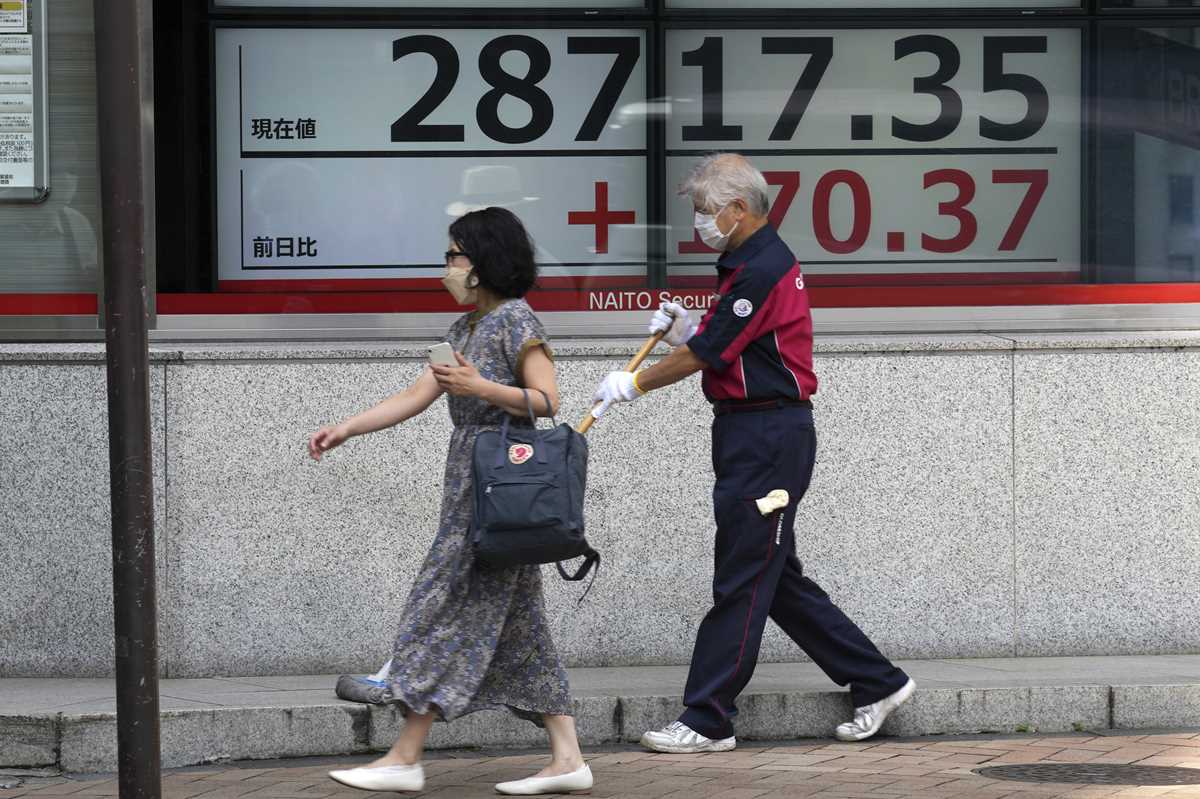 People walk past an electronic stock board showing Japan's Nikkei 225 index at a securities firm Monday, Aug. 15, 2022, in Tokyo. Shares were mixed in Asia on Monday after China's central bank cut a key interest rate and Japan reported its economy expanded at a faster pace in the last quarter. (AP Photo/Eugene Hoshiko)
People walk past an electronic stock board showing Japan's Nikkei 225 index at a securities firm Monday, Aug. 15, 2022, in Tokyo. Shares were mixed in Asia on Monday after China's central bank cut a key interest rate and Japan reported its economy expanded at a faster pace in the last quarter. (AP Photo/Eugene Hoshiko)BANGKOK (AP) — Shares were mixed in Asia on Monday after China's central bank cut a key interest rate and Japan reported its economy picked up momentum in the last quarter.
Tokyo and Sydney advanced while Hong Kong, Shanghai and Bangkok fell. U.S. futures edged lower early Monday, while oil prices declined.
The People’s Bank of China cut its rate on a one-year loan to 2.75% from 2.85% and injected an extra 400 billion yuan ($60 billion) in lending markets after government data showed July factory output and retail sales weakened.
Beijing is aiming to shore up sagging economic growth at a politically sensitive time when President Xi Jinping is believed to be trying to extend his hold on power.
The ruling Communist Party effectively acknowledged last month it can’t hit this year’s official 5.5% growth target after anti-virus curbs disrupted trade, manufacturing and consumer spending. A crackdown on corporate debt has caused activity in the vast real estate industry to plunge.
Meanwhile, Japan reported its economy expanded at a 2.2% rate in April-June from a year earlier, as consumer spending rebounded with the lifting of COVID-19 restrictions.
Tokyo's Nikkei 225 index added 1.1% to 28,871.78 and the S&P/ASX 200 in Sydney climbed 0.4% to 7,062.50. The Shanghai Composite index edged 0.1% lower to 3,275.34, while Hong Kong's Hang Seng index gave up 0.4% to 20,092.37.
South Korean markets were closed for a holiday.
Bangkok's SET index rose 0.4% after the Thai government reported the economy expanded at a 0.7% quarterly pace in April-June, slowing from 1.1% growth in the first quarter of the year.
Tourism has rebounded after two years of tight controls to fight COVID-19, but only to about a quarter of the pre-pandemic level.
“The outlook for the rest of the year will depend in large part on how quickly tourism recovers," Gareth Leather of Capital Economics said in a commentary.
On Friday, Wall Street capped a choppy week of trading with a broad rally, as the S&P 500 notched its fourth consecutive weekly gain.
The benchmark index closed 1.7% higher, at 4,280.15, for a 3.3% weekly gain. The S&P 500 hadn't posted such a good stretch since November.
The Dow Jones Industrial Average rose 1.3% to 33,761.05, while the Nasdaq gained 2.1% to 13,047.19. The Russell 2000 index of smaller companies added 2.1% to 2,016.62.
Major indexes got a big bump on Wednesday after a report showed that inflation cooled more than expected last month. Another report on Thursday showed inflation at the wholesale level also slowed more than expected.
They raised hopes among investors that inflation may be close to a peak and that the Federal Reserve could ease off on interest rate hikes, its main tool for fighting inflation.
The aggressive pace of rate hikes has investors worried that the Fed could steer the economy into a recession.
The yield on the 10-year Treasury fell to 2.84% from 2.88% late Thursday. It remains below the two-year yield. That's an unusual inversion of the expectation that borrowing money for a longer period should cost more than a shorter period. When investors demand a higher return for a short term like the 2-year than a longer one like 10 years, it's viewed by some investors as a reliable signal of a pending recession. The U.S. economy has already contracted for two consecutive quarters.
This week, the Commerce Department releases its retail sales report for July and retail giant Walmart reports its latest financial results.
Investors can also assess the health of the housing market when they get a report on home sales for July and the latest earnings from Home Depot.
In other trading Monday, U.S. benchmark crude oil shed $1.04 to $91.05 per barrel in electronic trading on the New York Mercantile Exchange. It lost $2.25 per barrel on Friday.
Brent crude oil, the basis for pricing for international trading, gave up $1.09 to $97.06 per barrel.
The U.S. dollar slipped to 133.20 Japanese yen from 133.43 yen. The euro weakened to $1.0246 from $1.0261.
Before you make your next trade, you'll want to hear this.
MarketBeat keeps track of Wall Street's top-rated and best performing research analysts and the stocks they recommend to their clients on a daily basis.
Our team has identified the five stocks that top analysts are quietly whispering to their clients to buy now before the broader market catches on... and none of the big name stocks were on the list.
They believe these five stocks are the five best companies for investors to buy now...
See The Five Stocks Here
MarketBeat's analysts have just released their top five short plays for May 2024. Learn which stocks have the most short interest and how to trade them. Click the link below to see which companies made the list.
Get This Free Report